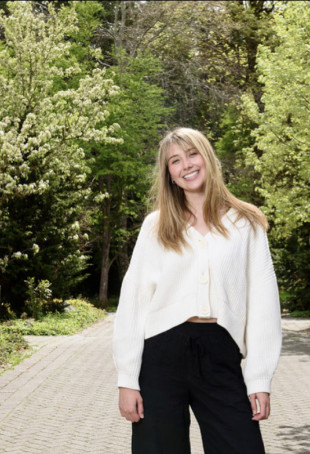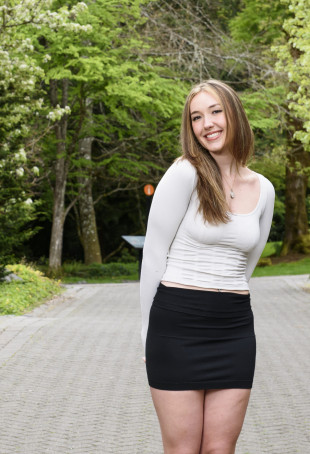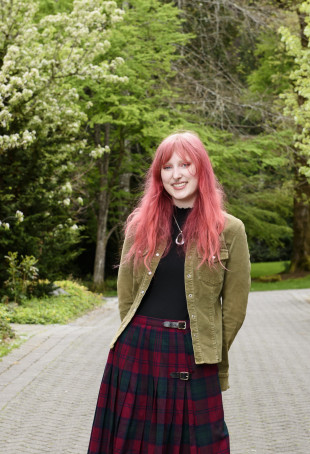26th Annual ENVX Symposium Focuses on ‘Life Within Capitalism’
This year’s symposium, Life Within Capitalism: Reconsidering Market Consequences and the Earth System, will be held October 16–19, 2023. The symposium will feature keynote speakers Professor Yuko Aoyama and Clarence Edwards, as well as an art workshop and a game about carbon cap and trade. All events are free and open to the public.
Environment Across Boundaries

by Mackenzie Kier BA ’26
Lewis & Clark’s 26th annual ENVX Symposium, titled Life Within Capitalism: Reconsidering Market Consequences and the Earth System, will be held October 16–19, 2023. All events are free and open to the public.
This year’s symposium focuses on capitalism—specifically, how the flow of money enables and/or hinders organizations from addressing our current environmental problems; what should be regulated in a free-market system; and how international trade of materials, goods, and waste affect land, air, and water at different scales.
Three student cochairs are responsible for organizing the ENVX Symposium, along with Associate Professor of Environmental Studies Jessica Kleiss. This year’s student cochairs are Julia Einaudi BA ’25, Kaylee Howser BA ’24, and Grace Blunck BA ’24.
- Grace Blunck BA ’24
As a cochair for the fall 2023 ENVX Symposium, it has been an amazing opportunity to connect with different global, national, and local scholars, entrepreneurs, and leaders. I feel that I have grown so much through this experience.
Milwaukee, WisconsinMore about Grace - Kaylee Howser BA ’24
The experience of being a cochair for the 2023 ENVX Symposium has taught me so much, and I am so excited for the event in the fall. I highly recommend getting involved in the symposia at L&C as an organizer!
Santa Cruz, CaliforniaMore about Kaylee - Julia Einaudi BA ’25
I am a cochair for the fall 2023 ENVX Symposium. It has been so cool to find speakers and organize events, and I am so excited to hold the symposium in the fall!
Seattle, WashingtonMore about Julia
“In my opinion, this is an extremely important conversation to have at Lewis & Clark,” says Howser. “I believe we have a passionate student body with a strong desire to take action, which is why we crafted our symposium to foster an environment in which students can explore their questions and gain multiple perspectives. Having conversations about things like different forms of capitalisms, market-based solutions, the flow of money, and waste impact all support us in better understanding the issues we encounter with the things we care about.”
Capitalism as a Theme
“The students were really excited about centering our symposium this year around the concept of capitalism,” says Kleiss.
According to Kleiss, interest in the topic surfaced as the result of an informal survey conducted in a class. Survey participants were asked what they thought was the greatest environmental disruptor among a list of possible options. A notable difference arose between the responses of L&C students and those of environmental professionals. L&C students chose “capitalism” more frequently than the professionals, whereas professionals chose “bipartisan politics” more frequently than students.
“This surprising result sparked many questions,” says Kleiss. “What is it about the concept of capitalism that evokes sentiments of disdain among our students? What is capitalism anyway? What is it not? What might be alternatives?”
As symposium organizers explored the topic, they spoke with faculty on campus who engage with these sorts of questions, including Maryann Bylander, associate professor of sociology; Andrew Bernstein, associate professor of history; and Chrys Hutchings, managing director of the Bates Center for Entrepreneurship and Leadership. The cochairs came to appreciate that capitalism isn’t a singular concept; rather, it’s a loosely framed grouping of economic concepts that can result in very different outcomes in different countries at different times in history.
“That made our original questions even more compelling,” says Kleiss. “We found ourselves puzzling over urgent and time-sensitive environmental issues, such as climate change, pollution and health, and the loss of biodiversity. Our economic system, both in the U.S. and globally, are pretty entrenched. So the conviction that we have to change our economic system in order to make progress on environmental issues seemed flawed. That led the student cochairs to wonder about what opportunities exist within a capitalist structure to move our society, collectively, toward a stable climate and resilient ecosystems.”
Symposium Events
The symposium features two keynote speakers: Professor Yuko Aoyama and Clarence Edwards. Professor Aoyama is an economic/industrial geographer with expertise in globalization, industrial organization, technological innovation, and cultural economy. She currently teaches at Clark University in Worcester, Massachusetts. Edwards serves as executive director, U.S. for E3G–Third Generation Environmentalism, in Washington, D.C. In that role, he works on policy issues related to the intersection of climate change, politics, and U.S. foreign policy.
This year’s symposium will also include a carbon emissions trading game, CarbonSim, which was developed by the Environmental Defense Fund. This in-person event will be held in J.R. Howard Hall, Room 202, on Monday, October 16, from 5 to 8 p.m. and requires advanced registration.
On Thursday, October 19, from 12:40 to 3:10 p.m., there will be a Waste Studies Art Workshop in Fields Center for the Visual Arts, Room 304. This workshop is in partnership with SCRAP, the ReBuilding Center, and Cara Tomlinson’s Art and Ecology class. There will be several speakers, including Adrian Brown, SCRAP executive director, and Christa McDermott, a social psychologist at Portland State University, whose work focuses on reducing consumption. Participants should bring a t-shirt and a piece of clothing to mend for an upcycled art project that will be completed during the workshop. This event requires advanced registration.
“I am most excited for the Waste Studies Art Workshop on Thursday,” says Einaudi. “This is the event I have personally worked the hardest on putting together, and I am so excited for students to attend it!”
All in all, the ENVX Symposium promises to offer participants a robust series of events.
“Our goal with this symposium is to challenge students’ preconceived notions, draw attention to issues within the topic of capitalism and the environment that people may not be regularly engaging with, and give people a place to reflect on and explore their own beliefs,” says Einaudi. “We hope and believe students will walk away from each event with new things they learned and will continue to think about after the symposium is finished!”
More Stories
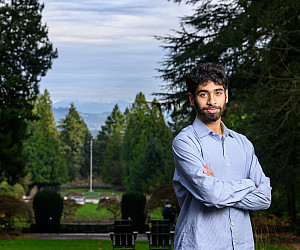
Tech Saavy
AI Helps Students ‘Take the Hint’
Ishan Abraham BA ’26 and a team of collaborators are developing an AI-powered learning system that delivers hints during hands-on cybersecurity exercises. Their work will be presented at next year’s 21st International Conference on Cyber Warfare and Security in Wilmington, North Carolina.
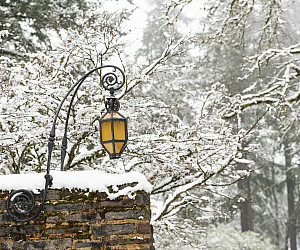
Year in Review
Top Stories of 2025
As the calendar year draws to a close, we’ve compiled a sampling of top stories from the undergraduate college, the graduate school, and the law school.
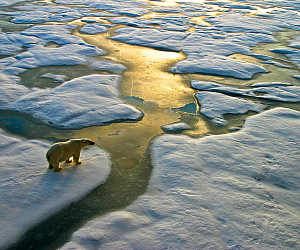
Defending the Natural World
Justice for Animals and the Environment on a Global Scale
The law school’s Global Law Alliance is helping to advance environmental and wildlife protections across the globe while giving students hands-on experience in international law.
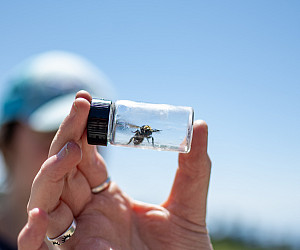
Buzzy Data
Visualizing the Region’s Wildlife Through Data
Students received hands-on data science experience with the U.S. Fish & Wildlife Service, predicting the climate and habitat vulnerabilities of the species in our region.

